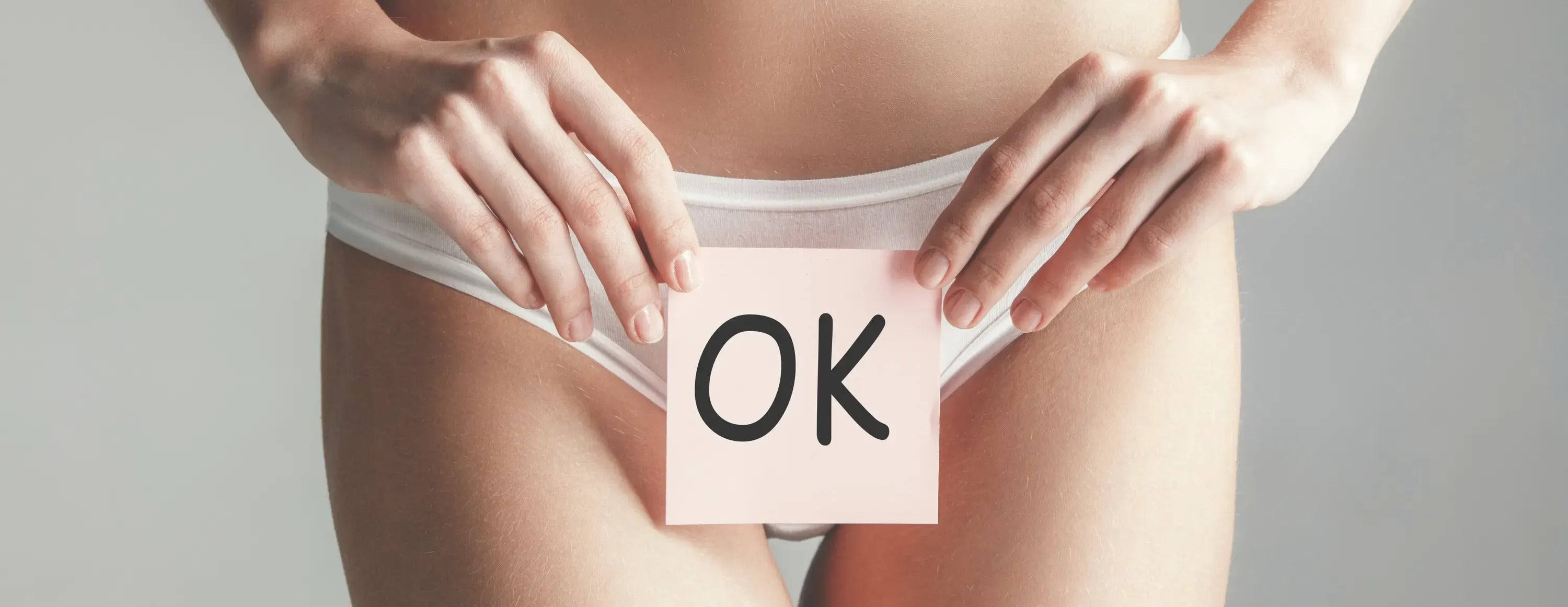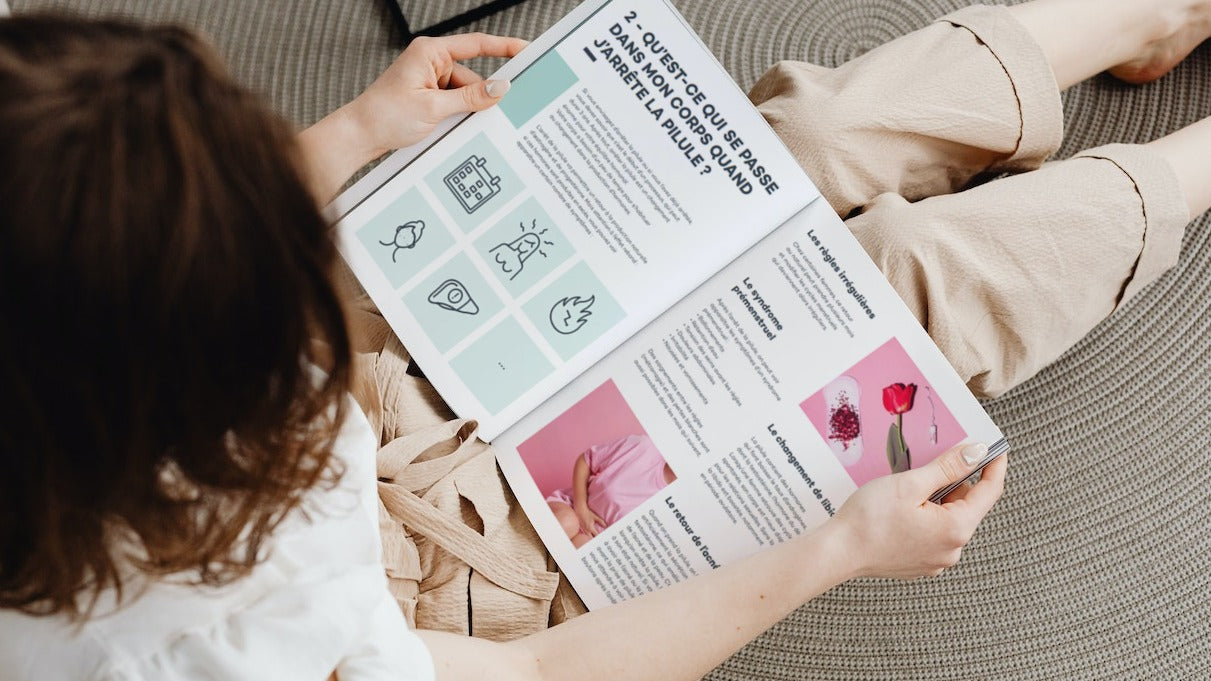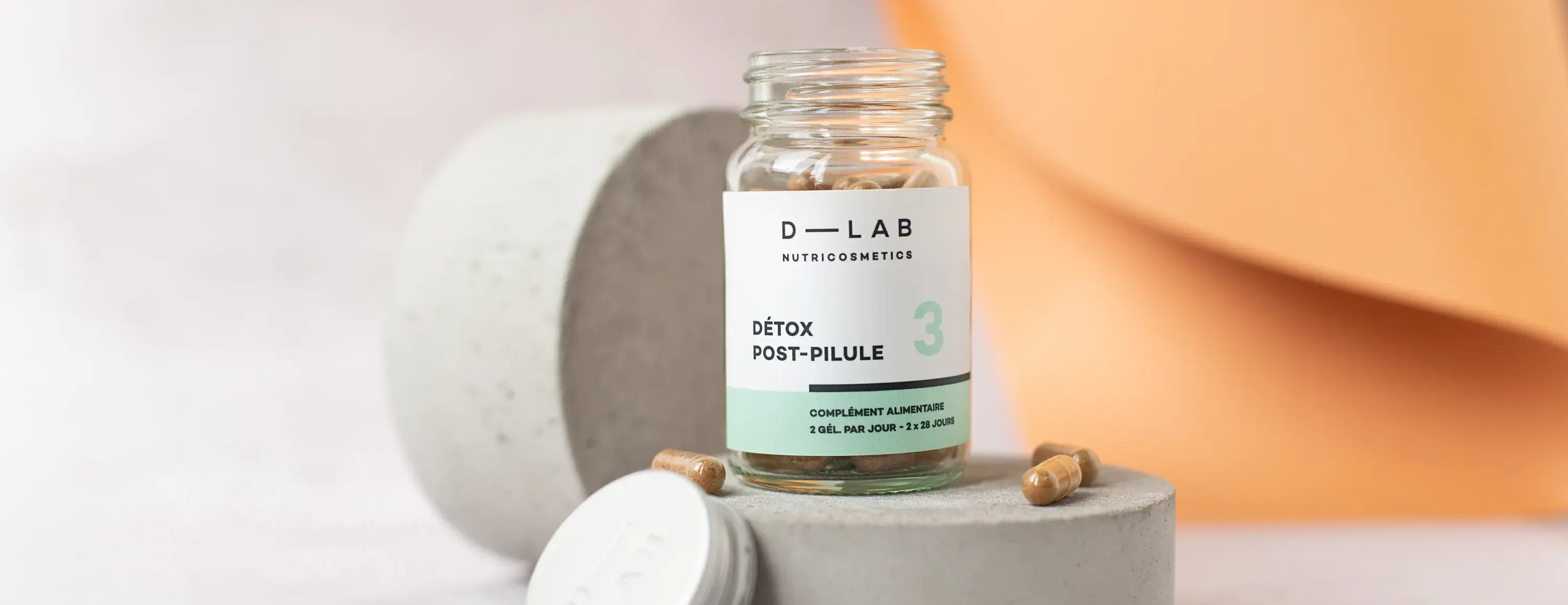
Stopping the pill is often difficult because it causes significant hormonal imbalance that affects the woman's health and well-being.
Premenstrual pain, irregular cycles, acne flare-ups, headaches, mood disorders … etc. The symptoms that appear following the cessation of synthetic hormones are the means of expression the body uses to show that it needs help!
To prepare the body for stopping the pill, it is necessary to adapt one's lifestyle, that is, to adjust all the choices and practices we make daily that impact our health.
In this article, we give 5 tips for stopping the pill with complete peace of mind.
Also discover our article hormonal rebalancing after stopping the pill and alternative contraceptive methods.
Summary
I - Adopting a balanced diet after stopping the pill
Stopping the pill is a key moment during which the body will have specific needs in order to regain its balance.
- Reduce toxic load: limit as much as possible industrial and processed products (prepared meals, cold cuts, etc.), food additives, and all foods rich in sugars and processed fatty acids.
- Eating enough: when stopping the pill, the body needs significant resources to regain its hormonal balance. It is important to eat enough, in a varied and structured way (proteins, carbohydrates, and lipids) to provide all the elements the body needs daily.
In addition to these dietary adjustments, it is crucial to prioritize foods rich in essential nutrients. Leafy green vegetables, fresh fruits, nuts, and seeds provide vitamins and minerals essential to support the hormonal system and metabolism.
Antioxidants also play a vital role in protecting cells against oxidative damage. They are found abundantly in berries, citrus fruits, and colorful vegetables. A diet rich in fiber, especially from legumes and whole grains, helps regulate digestion and maintain a healthy gut microbiome, which is essential for proper nutrient absorption.
It is also recommended to limit the consumption of caffeine and alcohol, which can disrupt the hormonal system and dehydrate the body. Instead, opt for herbal infusions, such as chamomile or peppermint, which promote relaxation and overall well-being.
Finally, hydration is essential. Drinking enough water throughout the day helps eliminate toxins and supports all bodily functions, including the restoration of hormonal balance.
Discover our e-book:
"How to better support our body before and after stopping the pill"

II - Prepare your skin
The skin reacts to the different hormones of the female cycle. When the excretory organs are saturated, toxins are eliminated through the skin, causing blemishes, acne, and excess sebum.
To avoid a breakout of acne after the pill, establish a routine suited to your skin type. It is crucial to deeply cleanse the skin without irritating it, using gentle and balancing products.
Avoid conventional cosmetics containing mineral oil, preservatives, synthetic fragrances, or chemical UV filters that can affect your natural hormonal balance. Favor gentle and natural skincare products.
To strengthen the skin's natural defenses, opt for treatments enriched with antioxidants such as vitamins C and E, which help protect the skin against external aggressions and free radicals. Remember hydration, which is essential to maintain the skin barrier intact. Choose moisturizing creams based on natural ingredients like aloe vera or jojoba oil.
Finally, don't forget to regularly exfoliate your skin to remove dead cells and promote cell renewal. Prefer gentle exfoliants made from natural enzymes.
III - Taking care of your liver
The liver plays a major role in the post-pill transition.
Indeed, in the body, the liver helps to filter, neutralize, and eliminate toxins and synthetic molecules, including the hormones in the pill.
The liver is often the organ most affected after years of taking the pill. All the toxins contained in the pill will overload the liver, which is often already overloaded by all the other sources of toxins (food, pollution, cosmetics, etc.)
When stopping the pill, the hormonal system is unbalanced and the liver is more overworked. It is therefore important to gently support the liver to assist it in its work.
To do this, several actions can be taken to facilitate the regeneration and proper functioning of the liver:
- Drinking plenty of water will allow the liver and the entire waste elimination system to effectively remove toxins.
- Foods rich in chlorophyll (dark green vegetables) contribute to cell regeneration, and foods containing sulfur (cabbage, broccoli..) help eliminate toxins and limit hormonal excesses.
- Include detoxifying herbs and plants such as milk thistle, artichoke, and dandelion in your diet. These plants are known for their beneficial properties on the liver, helping to regenerate its cells and improve fat digestion.
- Reduce alcohol and caffeine consumption, which can overload and irritate the liver. Favor natural drinks like herbal infusions, which support the detoxification process.
- Adopt a diet rich in fiber, including fruits, vegetables, whole grains, and legumes, to optimize intestinal transit and facilitate waste elimination.
- Engage in regular physical activity to stimulate blood and lymphatic circulation, thereby facilitating the liver's work and the elimination of toxins through sweating.
A healthy liver is essential for restoring the body's overall balance. Furthermore, it is advisable to consult a healthcare professional before starting any new detox routine, especially if you have pre-existing medical conditions.
Among natural solutions, dietary supplements can also play a key role. Specific formulas, such as Détox Post-Pilule, have been developed to support and protect the liver, while providing the essential nutrients for effective detoxification.
IV - Doing sports to sweat!
Sweating is a way the body uses to eliminate waste and toxins that clog the liver.
Indeed, the skin is an excretory organ that uses both the sebaceous glands and the sweat glands (sweating) to eliminate toxins.
Through regular physical activity, we aim to stimulate blood circulation, lymphatic circulation, and consequently, the elimination of toxins.
The choice of physical activity is essential. Endurance sports such as running, cycling, or swimming are particularly recommended. They allow for increased sweating, thereby promoting the elimination of toxins.
But sports are also an opportunity to take a moment for yourself, to disconnect and free your mind. This aspect is all the more important during a hormonal change such as stopping the pill, which can be a source of stress and anxiety.
It is also important to remember that hydration is an essential part of any sports routine. Drinking plenty of water before, during, and after exercise helps to compensate for fluid loss due to sweating and ensures good hydration of the body, thereby promoting better elimination of toxins.
Also remember to wear appropriate clothing for good sweating. Prefer natural materials like cotton or bamboo, which allow the skin to breathe and facilitate the evaporation of sweat.
V - Stopping the pill: Holistic dietary supplements
Composed of vitamins, minerals, trace elements, and plant extracts, dietary supplements are a natural and effective way to rebalance the body after stopping the pill. They act directly at the cellular level and provide the necessary micronutrients to alleviate post-pill symptoms.
To allow women to experience the cessation of their hormonal contraception peacefully, D-LAB has developed the Post-Pill Detox, a 100% vegan formula that supports the female hormonal system as well as the excretory organs involved in the detoxification process, to prepare the body for stopping the pill and thus avoid related symptoms.
1 - Restore hormonal balance
The Post-Pill Detox helps restore hormonal balance to relieve symptoms related to stopping the pill: premenstrual pain, irregular cycles, headaches, mood disorders... etc.
- Vitamin B6 regulates hormonal activity by maintaining normal levels of estrogen and progesterone. It acts on symptoms such as anxiety, irritability, and premenstrual nervous tension.
- Evening primrose oil, composed of gamma-linolenic and linoleic acids, helps regulate the hormonal system, maintain optimal comfort during menstruation, and aids in combating painful periods and hot flashes.
- The centifolia rose supports the function of the sexual organs and helps maintain a comfortable menstrual cycle.
2 - Preserve skin health
The Post-Pill Detox contains phytotherapy, vitamins, and essential minerals for good skin health to prevent these common skin problems and post-pill skin sensitivity.
- Zinc is a trace element essential for the skin and beneficial in reducing imperfections. It helps regulate sebum production, thus preventing pore blockage and allowing the skin to breathe. Zinc also promotes the regeneration of skin cells and fights against the effects of cellular aging.
- Le lodhra has astringent properties effective against acne. It helps to keep the skin healthy and improves the complexion.
3 - Detoxify the body
The Post-Pill Detox protects and supports liver health to promote the elimination and purification of the body.
- Milk Thistle contains silymarin, an ultra-effective hepatoprotective active ingredient. It deeply purifies the body, eliminates toxins present in the liver, and promotes rapid regeneration of damaged tissues.
- Burdock is a cleansing plant known for promoting the elimination of toxins and the purification of the blood.
It is also important to:
4 - Strengthen the immune system
In addition to restoring hormonal balance, preserving skin health, and detoxifying the body, it is crucial to strengthen the immune system during this transition period.
- Vitamin C is a powerful antioxidant that helps protect cells against oxidative stress and supports the immune system.
- Ginger is known for its anti-inflammatory and immune-boosting properties. It helps strengthen the immune system and fight infections.
- Echinacea is a plant traditionally used to strengthen the body's natural defenses and prevent respiratory infections.
5 - Promote digestive health
Good digestive health is essential for the effective absorption of nutrients and overall well-being.
- Probiotics are beneficial microorganisms that help maintain a healthy balance of intestinal flora, thereby promoting optimal digestion and a strong immune system.
- Fiber, found in fruits, vegetables, and whole grains, is essential for healthy digestion. It helps regulate bowel movements and prevent constipation.
- Aloe vera is known for its soothing and healing properties on the digestive system, helping to reduce inflammation and promote digestion.
6 - Improve mental and emotional well-being
Hormonal fluctuations can have a significant impact on mental and emotional well-being. Some dietary supplements can help stabilize mood and reduce stress.
- Magnesium is an essential mineral that helps reduce stress, improve mood, and promote restful sleep.
- Omega-3s, found in fish oil and flax seeds, are essential for brain health and can help reduce anxiety and depression.
- Rhodiola is an adaptogenic plant that helps increase the body's resistance to stress and improve mood.
7 - Support reproductive health
For women wishing to preserve their reproductive health after stopping the pill, certain supplements can be beneficial.
- Maca is a Peruvian plant known for its beneficial properties on fertility and libido. It helps balance hormones and improve reproductive health.
- Chaste tree, also known as vitex agnus-castus, is used to regulate menstrual cycles and relieve symptoms of premenstrual syndrome.
- Folate, the natural form of vitamin B9, is essential for reproductive health and fetal development during pregnancy.
"I am delighted with this collaboration with D-LAB NUTRICOSMETICS. It is one of the first brands I worked with on social media. And this collaboration turned into co-creation, by women for women. We decided to create together a treatment for all those who decide to stop the contraceptive pill or any hormonal contraception. We wanted to tell them, 'here is a product for you, here are people who understand your decision to move towards something more natural for your body.' Our goal is not to tell women what they should do with their bodies and contraception, but to say to those who decide to stop that a dietary supplement for them has now been created."
Amal Tahir, coach, writer, and self-love content creator ✨

VII - Consequences of this change
1 - Effects of this process
The process of stopping the pill can cause various effects on the body. Women may notice changes in their menstrual cycle, hormonal fluctuations, and changes in their skin. They may also experience an increase in libido, as natural hormones return to their normal course.
The effects may include premenstrual pain, headaches, mood disorders, and acne flare-ups. These symptoms are temporary and can be alleviated with a healthy lifestyle and appropriate dietary supplements. It is also possible to experience breast pain and bloating, signs that the body is trying to restore its natural balance.
Hormonal fluctuations can also have psychological effects, such as mood swings, anxiety, or depression. It is important to take care of your mental health during this transition period. It is recommended to engage in relaxation activities like yoga or meditation to manage stress and emotions.
2 - Rules after this turn
After stopping the pill, periods can become irregular for a while. The body needs time to regain its natural hormonal balance. Some women may quickly regain a regular cycle, while others may take several months to stabilize their menstrual cycle.
3 - Influence on weight
Stopping the pill can lead to weight changes. Some women may gain weight, while others may lose it. A balanced diet and regular physical activity can help maintain a stable weight. It is also advisable to monitor sugar and salt intake to avoid water retention.
4 - Impact on fertility
After stopping the pill, fertility may be temporarily affected. Some women may conceive quickly, while for others, it may take longer. It is essential to track your cycle and consult a healthcare professional for personalized advice on family planning.
5 - Positive effects of this decision
Stopping the pill can also have positive effects, such as a better understanding of one's natural menstrual cycle, a reduction in risks associated with taking hormonal contraceptives, and an improvement in overall health. Some women may notice an improvement in their libido and a general sense of well-being.
6 - Long-term benefits
The long-term benefits of stopping the pill include a better understanding of one's body and natural cycle, as well as a reduction in the risks associated with hormonal contraceptives. In the long term, this can also promote better reproductive health and increased awareness of one's body's needs.
7 - Role of social support
Support from those around you plays a crucial role when stopping the pill. Having open discussions with friends, family, or support groups can help share experiences and advice. This emotional support can be decisive in navigating this transition period calmly.
8 - Importance of education and information
It is crucial to be well informed about the effects of stopping the pill to better manage the changes. Resources such as e-books, scientific articles, and consultations with experts can provide valuable information. Understanding the body's mechanisms allows approaching this stage with more serenity.
Complete your routine:
Frequently Asked Questions
How does the body react to stopping the pill?
The body reacts to stopping the pill by trying to regain its natural hormonal balance. This can lead to temporary symptoms such as menstrual irregularities, skin changes, and mood swings.
How to manage this transition well?
To properly manage stopping the pill, it is recommended to adopt a healthy lifestyle, support your liver, take care of your skin, and engage in regular physical activity. Dietary supplements can also help alleviate symptoms.
When do the side effects disappear?
The side effects of stopping the pill usually disappear after a few months, once the body has regained its natural hormonal balance. However, the duration can vary from one woman to another.
What are the most common symptoms after stopping the pill?
The most common symptoms include changes in the menstrual cycle, increased premenstrual pain, acne flare-ups, and mood swings. These manifestations are often temporary and related to the body's readjustment to its natural hormonal functions.
How to support your body during this transition?
To support the body, it is crucial to maintain a balanced diet, rich in essential nutrients. Hydration also plays a key role in helping to eliminate toxins. Dietary supplements, such as those offered by D-LAB NUTRICOSMETICS, can provide additional support by supplying the necessary vitamins and minerals to restore hormonal balance and promote better overall health.
Should you consult a healthcare professional?
It is always advisable to consult a healthcare professional before making important decisions regarding your health. A doctor or nutritionist can provide personalized advice and help choose dietary supplements suited to your specific needs. They can also monitor the transition and provide support in case of persistent or concerning symptoms.
What are the long-term benefits of this decision?
In the long term, this decision can help better understand and manage one's natural menstrual cycle, reduce the risks associated with prolonged use of hormonal contraceptives, and improve overall health. Some women also report an improvement in their mental and physical well-being after this transition.








